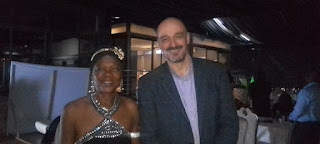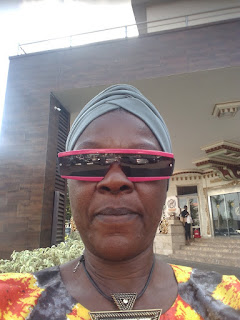On the 29th of June 2022, the Close of Project Workshop for 'Transforming farmer-herder conflict in Nigeria through technological innovation and outreach' was held online via Zoom. Prof. Matthew Turner, Prof. Leif Brottem (Project Coordinator), Allisa Stark and others joined the meeting from the USA. Dr. Dayo Oluyemi-Kusa and invitees joined from Abuja. Prof. Azeez Olaniyan came through from Oye-Ekiti, while Dr. Saeed Owonikoko and his team of herders who had tested the Mapeo Mobile App shared their experiences from Yola! It was indeed a robust exchange across the ocean. I was and still is the Civil Society Lead for the project in Abuja. The project was funded by the American Embassy, Abuja. The twelve-month project began in August 2021 and the cycle closes August 2022. Some of the key personnel in the project are:
*Prof. Matthew Turner - Vilas Distinguished Achievement Professor of Geography, University of Wisonsin-Madison, USA
*Prof. Leif Brottem - Associate Professor of Global Development Studies, Grimnell College, Iowa/University of Wisconsin-Madison: Oct. 2021-Present/Project Coordinator
*Dr. Dayo Oluyemi-Kusa - Independent Conflict Transformation Strategist/Gender Specialist & Former Director, Institute for Peace & Conflict Resolution (IPCR), Abuja/Civil Society Lead for Nigeria-based activities
*Prof. Azees Olaniyan - Professor of Political Science, Federal University, Oye Ekiti, Nigeria/Nigeria-based academic team leader
*Dr. Saeed Owonikoko - Lecturer, Modibbo Adamawa University of Technology, Yola, Adamawa state, Nigeria/Lead, Toolkit pilot testing in Adamawa state, Nigeria
*Alissa Stark - Web Cartographer, University of Wisconson-Madison Cartography Lab (https://geography.wisc.edu/cartography)/Customised a version of the Mapeo App for the use of pastoralists in Nigeria)
Dr. Dayo Oluyemi-Kusa presenting her paper titled: 'Remarks on the farmer-herder crisis in Nigeria' @ the Close of Project Workshop held @ the American Corner, Abuja
The papers presented at the Online Workshop are:
*Project background and overview of pastoral mobility vis-a-vis conflict - Prof. Leif Brottem
*Remarks on the farmer-herder crisis in Nigeria - Dr. Dayo Oluyemi-Kusa
*Presentation of Toolkit - Alissa Stark
*Toolkit experiences from Song & Gombi LGAs of Adamawa state, Nigeria - Dr. Saheed Owonikoko/Danjuma Musa/Manu Jibo
*The Mapeo App: Legal & policy considerations - Prof. Azeez Olaniyan
*Future direction/collaboration - Prof. Leif Brottem/Dr. Dayo Kusa/Dr. Saheed Owonikoko
The first poster designed by Dr. Dayo Kusa when the Close of project workshop was to be held face-to-face @ IPCR, Abuja. The paucity of funds and logistic considerations changed plans to holding the workshop online, with Abuja invitees @ the American Corner...
About the project & the Mapeo Mobile App
The project addresses land access as a root cause of farmer-herder violence in Nigeria via strengthening conflict transformation mechanisms through US-Nigeria collaborative development of a Mobile Geo-spatial Toolkit. The kit would make adequate info on land resources more accessible/available to all stakeholders. The App would also be 'scalable' across Nigeria's farmer-herder conflict hot-spots. The project is in partnership with the Federal University, Oye-Ekiti & Modibbo Adamawa University of Technology, Yola. (Source: linkedin.com/in/leif-brottem-957a4250)
The Mobile App is a customised version of the offline - first Mapeo Mobile Application (Digital Democray) for pastoralists in Adamwa state, Nigeria. The App would give the pastoralists control over the spatial data that they feel would assist them in the mitigation of conflict over land use and resources. The toolkit for the Nigerian team includes custom observations and options which the observations as well as icons and map tiles. (Source: linkedin.com/in/alissa-v-stark-5b106b16)
Photo L-R: Chrisantus Lapang (EWER Manager, Mercy Corps), Dr. Dayo Oluyemi-Kusa & Bryan Weiner (Search for Common Ground - SFCG)
The beauty of the Mapeo Mobile App is that it's an 'Open Source Platform', locally driven and team-oriented. It's adaptable to low band width environments. The data structure facilitates flexible information management for communities. The Google earth engine sets global standards for remote sensing analysis of land cover and other environmental data. Mapeo designed an Application Protocol Interface (API) to interact with real-time Earth Engine data over email or website. (Source: Project Proposal to the American Embassy).
The process for the selection of the toolkit pilot testing sites was systematic and inclusive in consonance with the standards of Participatory Rural Appraisal (PRA). The Monitoring and Evaluation (M&E) of the testing of the toolkit is based on current UNDP guidelines for measuring projects' inclusivity, efficiency and efficacy towards achieving the following three goals:
1) Pace the Mobile Toolkit development.
2) Monitor the phases of production of the resource governance principles.
3) Organise the workshop according to pre-established criteria.
4) Execution of the media and outreach campaign
The goals are:
1) Develop a Mobile Geo-spatial Toolkit to strengthen conflict transformation mechanisms through US-Nigeria technology cooperation. This would improve access to land info.
2) Deploy the toolkit and conduct outreach ti increase its impact. Initiate national outreach and influence the debate on land governance and the farmer-herder crisis.
Some of the participants @ the Abuja end of the 'Close of Project Workshop': 2nd left front row: Chrisantus Lapang - EWER Manager, Mercy Corps, Abuja. 3rd left front row: Engr. Adams Otakwu - Concener of the 'Conference of Civil Society of Nigeria with representatives in the 774 LGAs in the country.
There was robust online discussion where Prof. Matthew Turner said that the use of polygons rather than simple points could be more helpful while deploying the Mobile App. Some commentators wondered if every pastoralist must own a mobile phone. The unanimous response was that it may not be necessary for every herder to possess a mobile phone. Traditional rulers, community leaders, district heads and other respected and trusted members of the community could hold at least one mobile phone with the Mapeo Mobile App installed on it in trust for the pastoralists in the area. A particular well known individual within the community could be saddled with the responsibility of disseminating the required information that would identify potential grazing spots while avoiding destruction of farmland...
Oscar Ekponimo, award winning AI/Robotics Expert/CEO of Gallery of Code, Abuja/Inventor of the Chowberry App was worried about the licensing structure for the App, etc. I guess the discussion between Oscar and Alissa should continue in order to further fine tune the App.
Next Steps:
1) It is obvious from the foregoing that the customised Mapeo Mobile App intended for the use of pastoralists in Nigeria, beyond Adamawa state where it's been tested, is work in progress, which needs to be constantly fine-tuned.
2) Further discussion is necessary between Oscar Ekponimo, Alissa Stark and other stakeholders for the evolution of the App into what is considered germane for the mitigation and indeed transformation of the farmer-herder crisis in Nigeria.
3) The ultimate aim should be the ownership of the Mapeo Mobile App by those for whom it's meant, the pastoralists in Nigeria. The farmers should not be left out of the discourse if we indeed wish to elicit harmony in that sector.
4) Because the Close of Project Workshop was held online, we missed out on critical outreach in Abuja to government agencies and other vital stakeholders. If and when there's more funding for the project, we should note that the outreach is still necessary.
5) The Press, the fourth estate of the realm, of which I'm a valued stakeholder (I was the first National Assembly Correspondent of the Guardian Newspaper at inception in 1983) is germane for the successful dissemination of the 'nitty gritty' as regards the Mobile App. Subsequent funding could make provision for training in Specialised Conflict Reporting - Reportage of Farmer-Herder Conflict in Nigeria. Many of the reporters have no clue as to the techniques of professional reportage of the conflict. Some of the current reports either in the 'traditional' or 'new' media actually contribute to the escalation of the conflict!
6) This project has definitely contributed to the strengthening of cordial relations between Nigeria and the USA. Such conviviality needs to continue.
7) Conflict Impact Assessment (CIA) of the App is necessary.While using the Customised Mapeo Mobile App, conflict could arise between and among pastoralists. Besides, even more complex conflicts could arise between pastoralists and farmers. What is to be done? I am a Chartered Mediator/Conciliator (Certified over two decades ago). In consultation with our formidable team, a robust conflict transformation mechanism specifically tailored towards relieving tension that occurs on account of the App could be developed.
8) The gender dimension: We should note that not all pastoralists are male. Some women and girls are also pastoralists. They have special needs, separate from the men and boys. Could their needs be taken into account in the deployment of the Customised Mapeo App? For example, could there be designated polygons rather than specific points where female pastoralists could access water?
9) The poor internet connection via Zoom/Google Meet, etc. frustrated me many times. We should continue to think of creative ways of making communication across the ocean relatively seamless...
10) The current language of the App is English, which most of the pastoralists and indeed farmers do not speak. In order to 'democratise' the App, there should be inclusivity as regards the use of language, starting with the Hausa language which most pastoralists and some farmers speak. Subsequently, other major Nigerian languages could be incorporated into the App.
The issues raised under 'next steps' are not exhaustive. The conversation continues off-line. Before I sign off, however, I must commend the leadership qualities of Prof. Leif Brottem (Coordinator of the project), who was under pressure throughout the project, working with a new set of 'colleagues' from Nigeria he hardly knew. He managed the cultural differences with dexterity, maturity and tact, while ensuring that the project continued against all odds. Bravo to every member of the team and our esteemed invitees. I appreciate you all...
Dr. Dayo Oluyemi-Kusa facilitating @ the Workshop
Dr. Dayo Oluyemi-Kusa outside the venue of the Workshop @ the American Corner, Abuja
Related Links
*Promoting peace & managing farmer-herder conflict: The role of Civil Society Organisations (CSOs) in Agogo, Ghana https://www.cambridge.org/.../592467348FA...
*What Nigeria must do to stop farmer-herder clashes https://www.premiumtimesng.com
*Herders against farmers: Nigeria's deadly conflict https://www.crisisgroup.org/.../nigeria/252-herders-against-farmers-nigerias-expanding,,,
*9 facts you did not know about farmer-herder conflict in Nigeria https://www.naija.ng
*ASUU seeks solution to farmer-herder clashes thenationonlineng.net/unijos-asuu-seeks-solution-farmer-herder-clashes/
*FFARN Policy Brief: The implications of the 'Open-grazing prohibition & ranches establishment law' for farmer-herder relations in the Middle-Belt of Nigeria https://www.sfcg.org/policy-brief-legislation-farmer-herder-nigeria/
*Herders-farmers clashes today: Ecology, class & categorical politics in contemporary Nigeria https://www.quicknews-africa.net/herdsmen-farmers-clashes-today-ecology-class-and.../
*The drought-migration nexus: Implications for socio-ecological conflicts in Nigeria https://www.researchgate.net/publications/273909802
*Land, conflict, climate change & violence in Nigeria: Patterns, mapping & evaluation nsrp-nigeria.org
*Pastoralism in Nigeria's Middle-Belt region: A resource or a curse? eajournals.org
*FFARN Policy Brief: Responses to conflicts between farmers & herders in he Middle-Belt of Nigeria: Mapping past efforts & opportunities for violence prevention https://sfcg.org/policy-brief-responses-conflicts-farmer-herder-middle-belt-nigeria/
*FFARN Policy Brief: Seeking security & stability: An analysis of security responses to farmer-herder conflicts in the Middle-Belt region of Nigeria https://sfcg.org/policy-brief-seeking-security-stability-analysis-security-responses-farmer-herder-conflict-middle-belt-nigeria/
*FFARN Policy Brief: Transnational dimensions of conflict between farmers & herders in Western Sahel & Lake Chad Basin https://sfcg.org/policy-brief-transnational-dimensions-conflict-farmers-herders-western-sahel-lake-chad-basin/
*The impact of the farmer-herder conflict on women in Adamawa, Gombe & Plateau states of Nigeria sfcg.org
*Prepared for peace: A cross-cutting conflict transformation toolkit for conflict & violent extremism in Northern Nigeria sfcg.org
*Report on the future of the Forum on Farmer-Herder Relations in Nigeria (FFARN): 2021 and byond sfcg.org
*Pastoralists vs arable farmers dlc.dlib.indiana.edu/dlc/bitstream/handle/10535/1034/gefuj080502.pdf
*Resource use conflict between farmers and herders https://www.researchgate.net/.../272510966_resource_use_conflict_between.../
*Pastoralist-farmers conflicts & the search for a durable resolution https://www.dailytrust.com.ng/pastoralist-farmers-conflicts-and-search-peaceful.../
*Socio-economic effects of farmer-pastoralist conflict https://www.ajol.info/index.php/jae/article/download/126590/116117
*Newspaper coverage of herdsmen-farmers conflict in central Tiv-land, Benue state, Nigeria journals.sagepub.com/doi/abs/10.1177/1750635217741912
*Farmer-herder relations & conflict management https://cgspace.cigar.org/bitstream/handle/10568/.../TranshumancePastoralism.pdf
*Livelihood issues in farmer-herder conflicts www.academicjournals.org/journal/AJAR/article-full-text-pdf/OC8AB8864785
*Herder-farmer conflict in Nigeria: A threat to peace-building https://africaupclose.wilsoncentre.org/herdsmen-and-farmers-conflict-in-nigeria.../
*The political ecology of farmer-herder conflicts in Nasarawa state, Nigeria www.aijcrnet.com/journals/vol_4_no_2_february_2014/11.pdf
*Herders vs farmers: Nigeria's other security crisis https://www.worldpoliticsreview.com/.../herders-vs-farmers-nigeria-s-other-security-crisis/
*Only integrated livestock settlement can end farmer-herder conflicts thenationonlineng.net/integrated-livestock-settlement-can-end-farmer-herder-conflicts/
*The transformation of conflict between pastoralists & cultivators in Nigeria rogerblanch.info/conflict/herder-farmer.../
*Jihadists, drought threaten pastoral life in Sahel region https://t.co/4891FOL2SI
*Device that pulls water from the air wef.ch/2IcXfpC
*The application of Geo-spatial Analytical Technique in the... https:digitalcommons.kennesaw.edu/cgi/viewcontent.cgi...
*Nigeria: farmers & herders clash over land https://iwpr.net/global-voices/nigeria-herders-farmers-clash-over-land/
*2016 Strategic Conflict Assessment of Nigeria www.ng.undp.org/.../nigeria/.../strategic-conflict-assessment-nigeria/
*Conflicts between transhumant pastoralists & farmers in Nigeria https://pastoralist2.wordpress.com/...conflicts-between-transhumant-pastoralist
*Nigeria's 'cattle colony' problem https;//www.aljazeera.com/.../nigeria-cattle-colony-problem-180128104645...html
*Land use conflict between farmers & herders cdn.intechopen.com/.../In-Tech-Land_use_conflict_between_farmers_and_herdsmen/
*An assessment of farmer-pastoralist conflict in Nigeria using GIS www.ijesi.org/papers/Vol(4)7/E047023033.pdf
*Arable land jasdevr.org/ej/index.php/jasd/article/download/32/3
*Agricultural investments & pastoralists www.mdpi.com/2071-1050/9/11/2063/pdf
*From complementarity to conflict www.accord.org.za/ajcr-issues/from-complementarity-conflict/
*Transhumance # Pastoralism: Long-running Reindeer Movement in search of # Pasture Stoking Up Tension between Sweden & Norway https://t.co/kwvUgNbj69
*How fake news fuels Nigeria's farmer-herder crisis https://www.bbc.com/news/world-africa-44655148/
*Plateau: Farmer-herder forum suggests solutions to clashes htps://www.dailytrust.com.ngplateau-farmer-herder-forum-suggests-solutions-to-clashes/

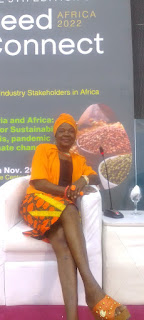
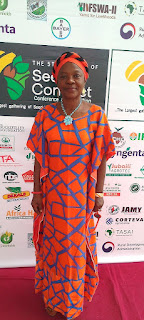

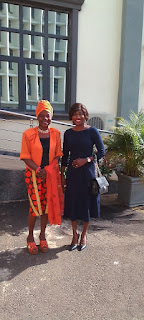
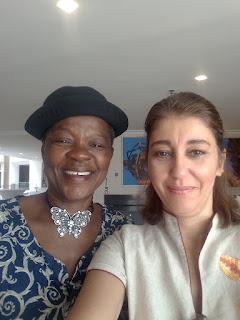

















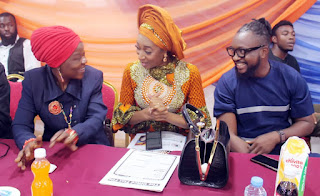















.jpg)
.jpg)




